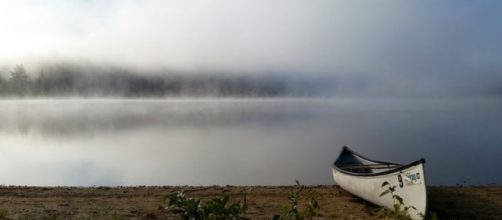In Canada, saying "I have my life jacket on" is not always enough when you go overboard. There are other dangers, as these folks discovered on their first canoe trip of the spring season. These were experienced men who had canoed together many times. They lost everything because they overlooked just one of the many dangers of being in a canoe.
Mother Nature can be very unforgiving
Spring is always a time of the year when Canadians look ahead to the warmth and beauty of Canada's summers. Lakes and rivers are in abundance, and offer a natural, adventurous environment for outdoor enthusiasts.
I have been a power boater and a sailor for decades, and I have enjoyed our great outdoors to its fullest. I have transported many people in my boats, at different times, through my years on the water. Sometimes, out on the glassy lake, under the full moon, it feels almost surreal. But I have warned every person who has gone boating with me, "We have a lot of fun out here. But please remember that under the wrong circumstances the lake is a very unforgiving place. This is my boat, and I am the captain until we arrive safely back here. Now let's go have fun."
With long winters and temperatures well below zero degrees, all the lakes and most rivers freeze over. If you end up in the water during the winter, or early spring, your life is in serious jeopardy.
You do not even have minutes to save yourself. By the time you have been in the water for one minute, your muscles start cramping, your legs draw up to your stomach in an attempt to conserve heat, and you are unable to help yourself, let alone another person.
Two fathers and two sons, out having fun
Somehow, these fathers and sons ended up in the water, in Northern Manitoba; not a part of the country for swimming in early May. The ice is gone and the water is clear and calm. It can be very deceiving, and one careless move can cause a catastrophe. The water temperature could have been three to four degrees above freezing when they went canoeing. I doubt if the cause of the accident will ever be discovered.
However, their bodies were found, floating, a short distance from the capsized canoe.
Caution, danger, thin ice -- use at your own risk
I live on a lake in central Ontario and although it does not flow like a river, there are currents which create thin ice. Every year somebody goes through the ice on our lake. Sometimes they live, but more often the marine police retrieve the bodies. The victims may even have checked the ice thickness and found that the ice was safe where they tested. But it might not be safe in other areas where the current is strong.
The ice had just left the lakes and rivers in Northern Manitoba, when two fathers and two sons went on their first trip of the summer, and their last.
Four people in a canoe that capsized, never had a chance. Even the strongest swimmers cannot last more than a minute in three degree water, and this time, they were just too far from shore.
Lessons learned
One spring, myself and some friends donned our scuba diving wet suits and went out on the thin ice to play soccer. The wet suit is an excellent insulator and very buoyant. When diving, it is necessary to wear heavy weights in order to be able to submerge. I will tell you that even with a buoyant and insulated diving suit on, it was very difficult to get back up on the thin ice. Under other circumstances, it would be almost impossible.
There is a lesson to be learned from the tragic death of these four friends. Mother Nature is not always forgiving, so I will say it once more, to anybody going out boating, "Please be wise on the water."


